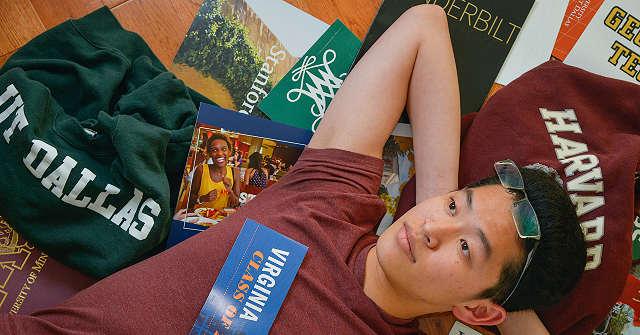Like two ships passing in the night, proponents and opponents of H1-B visas can’t see the forest through the trees. The void of American workers for qualified H‑1B positions was really caused by the ever-increasing scale and relaxed requirements of F‑1 student visas, and universities depending on international enrollment to balance budgets. Admissions at leading public institutions like Georgia Tech have become as competitive as elite private universities, yet a material share of limited undergraduate seats increasingly goes to non‑U.S. students who can pay full tuition and additional fees.
The federal government issued approximately 401,000 new F‑1 visas in FY 2024, and there are about 1.1 million international students currently in the United States. Against the backdrop of significant federal and state funding flowing to public universities, the question is simple: if taxpayers subsidize these institutions, should their admissions priorities and resource allocation not first favor the students whose families fund them?
Georgia provides a compelling illustration. Georgia Tech is among the most sought‑after public universities in the nation for engineering, computer science, and related technical disciplines. Highly qualified Georgia students—fully competitive on grades, test scores, and extracurriculars—are denied admission even as roughly 1,000 undergraduate seats in engineering and science fields are filled by international students. At a state school supported by both Georgia taxpayers and federal funds, it is reasonable to ask why students with no ties to Georgia or the United States are prioritized in this way. The standard response from universities is financial: international students pay full freight and cover ancillary costs. But the fact that this practice shores up institutional budgets does not make it sound public policy, particularly when it systematically displaces qualified American applicants from taxpayer‑supported institutions.
The downstream labor market implications compound this concern. Each year, the government allocates 65,000 H‑1B visas, with an additional 20,000 for advanced degree holders. International undergraduates and the more than 500,000 international graduate students in U.S. programs are well-positioned to transition into those H‑1B slots upon graduation. When a public university replaces a Georgia student with an F‑1 student in a high‑demand field, it does more than deny one seat today; it increases the pipeline pressure tomorrow for H‑1B allocations in exactly the sectors where Americans could be trained to fill roles. Put differently, a policy choice at the admissions stage reverberates into the labor market, reinforcing the perception of “shortages” that H‑1B is then asked to solve. If we invested those same seats and resources in qualified American students, the need for H‑1B workers in many specialized roles would diminish over time as more domestically trained graduates enter the workforce.
This pattern is not confined to a single campus. At flagship public universities nationwide, international enrollment claims thousands of undergraduate seats and hundreds of thousands at the graduate level. The cumulative effect is to ration opportunity for American students in precisely the programs that drive economic mobility and national competitiveness. Meanwhile, federal appropriations and state subsidies continue to underwrite these institutions, even as they rely on international tuition to fill budget gaps.
The policy path forward is clear. First, tighten the issuance of F‑1 visas in a manner aligned with the mission of public higher education, focusing scarce seats and subsidized resources on U.S. students, particularly in high‑demand STEM fields where the public return is greatest. Second, re‑align university incentives by conditioning federal and state support on admissions practices that prioritize qualified domestic applicants. Third, improve domestic education pathways to ensure that American students are prepared to succeed in rigorous programs, thereby expanding the pool of competitive applicants and reducing long‑run dependence on H‑1B visas.
Universities may argue that international enrollment enhances diversity and global engagement. Those values matter. But they do not justify a funding model that displaces qualified American students from publicly supported institutions and hard‑wires downstream reliance on non‑immigrant work visas to meet talent needs. A balanced approach can preserve academic excellence and international collaboration while restoring the primacy of American students in admissions at taxpayer‑funded schools. The United States can and should educate its own—both because it is fair to the taxpayers who support these institutions and because it is the surest way to build a durable, self‑reliant pipeline of talent for the nation’s most critical sectors.
Personal Perspective:
What first drew me to this issue wasn’t just the H‑1B program—it was the growing difficulty that my daughter and many other Georgia students face in gaining admission to top public universities in their own state. This challenge isn’t unique to Georgia; it’s playing out across the country. At institutions where international students fill thousands of undergraduate seats on F‑1 visas, qualified American applicants are increasingly squeezed out.
In Georgia and Florida, where state taxpayers cover the lion’s share of tuition—up to 95% in my daughter’s case if she maintains solid academic performance—the implications are especially stark. Public universities argue that international students help balance budgets by paying full tuition and fees. But when those financial incentives result in the displacement of domestic students from publicly funded institutions, we must ask: Is this sound public policy?
The issue isn’t just economic—it’s structural. If we continue to prioritize international enrollment at taxpayer-supported schools, we risk undermining the very mission of public higher education. The question is no longer whether these practices help universities stay afloat. The question is whether they serve the students and families who fund them.
Read the full article here
